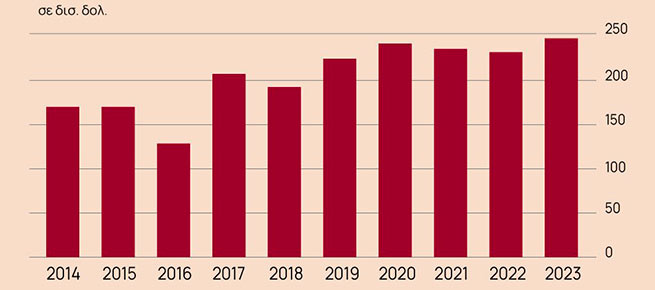The number of debt obligations of the European Union is not only not decreasing, but is rapidly gaining momentum. According to Bloomberg estimates, in January 2023, a new historical record for debt issuance was recorded in a month.
The United Kingdom and European Union bond issuance is valued at 244 billion euros (including today’s auctions), beating the previous January record of just under 239 billion euros three years ago.
Issuers prefer when they feel they have the opportunity to enter the markets to do so, according to David Jean, head of European fixed income at Franklin Templeton, rather than waiting. “This year, the impact of a half-percentage rate cut by the European Central Bank next Thursday and another of the same size in February is expected to be strong, so issuers believe that it will become more expensive to sell bonds, especially the most short-term issues.”
Issuance of external debt bonds EU by years in billions of US dollars
For their part, investors are pouring into sovereign debt markets amid a rally in global debt markets since the beginning of this year that has driven up corporate bond yields and cut funding costs. In particular, banks have been very active in issuing securities, seeking to fill the financing gap that will arise as they prepare to repay cheap loans provided by the ECB during the pandemic.
These debt obligations of banks led to the fact that five days before January 13, the week with the largest number of debt issues ever placed on the market was recorded. More than €100 billion worth of bonds have been issued this week, with issuers such as Deutsche Bank and Credit Agricole.
Bonds totaling €15bn are expected to be auctioned tomorrow, with the UK alone set to issue £6bn worth of bonds and bids are expected to exceed £65bn. Meanwhile, the €5bn EU issue has already attracted bids for almost €52bn.
An impressive start to the year in bond markets paints a different picture than in 2022, when interest rate hikes by central banks to contain accelerating inflation hit bond markets negatively. As a result, demand was reduced, and a number of bond issues were postponed.
In fact, the European Union is trying to pay off the costs it incurred in the economic war with the Russian Federation. At the same time, you need to understand that these are debts that will have to be repaid with interest. This means that an increase in inflation and a decrease in the standard of living of the population are inevitable.







More Stories
Greece: growth in deposits from households and businesses in March 2024
EU employment record: Greece "stuck" in a low position
“Bonus” of 300 euros for the long-term unemployed